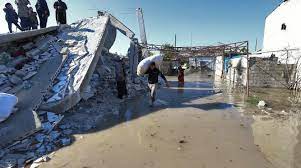GENEVA (Reuters): The first United Nations convoy carrying aid to Syrians stricken three days ago by a deadly earthquake crossed from Turkiye on Thursday, witnesses and a border crossing official said.
The convoy entered Syria at the Bab Al Hawa crossing, the sources said. Turkish authorities said they would open other crossing points in two days if security was sound.
The UN envoy to Syria earlier said “absolutely everything” was needed in terms of aid following Monday’s huge earthquake, which devastated swathes of southern Turkiye and northern Syria.
It struck at night and was followed by powerful aftershocks. The death toll from it neared 16,000 on Thursday as frustration simmered over the slow delivery of aid.
The United Nations has described Bab Al-Hawa as a lifeline for accessing the opposition-controlled area of Syria, where it says some 4 million people — many displaced by the country’s 12-year conflict there — were already relying on humanitarian assistance before the quake struck.
“We need lifesaving aid,” UN envoy Geir Pedersen told reporters in Geneva.
“It’s desperately needed by civilians wherever they are, irrespective of borders and boundaries. We need it urgently through the fastest, most direct and most effective routes. They need more of absolutely everything.”
Pedersen called for assurances that there would be no political hindrances inside Syria to getting aid to where it was most needed.
“We had a problem because the roads leading to the border crossing (between Turkiye and Syria) had been destroyed,” Pedersen said. “But we were assured that we will be able to get through the first assistance today.”
Rescue workers said the United Nations’ efforts were insufficient and what was most in need was heavy equipment for search-and-rescue operations where many people are believed to be still buried under debris.
“The UN are not delivering the aid that we are in most need of to help us save lives with time running out,” Raed al Saleh, who leads the main volunteer rescue group known as the White Helmets, told Reuters.
Volunteers and rescue workers were relying on simple tools and old cranes in towns and cities that have seen whole neighborhoods wiped out, charities and rescuers said.







